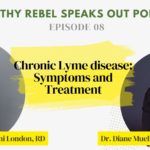Breast cancer is an undeniable reality for women—one in eight will face a diagnosis. Beyond the statistics, however, lies a web of misinformation that leads to fear, confusion, and sometimes unnecessary treatment. In a revealing discussion, Dr. Jenn Simmons, an expert in breast cancer treatment, shared insights on this disease, her journey from conventional to functional medicine, and surprising truths about hormone replacement therapy and its connection to breast cancer.

Section 1: The Prevalence of Breast Cancer and the Misinformation Surrounding It
Dr. Simmons highlights that although one in eight women will be diagnosed with invasive breast cancer, the impact of this disease is far-reaching, affecting families, friends, and communities. Beyond these numbers lies another concern: the widespread misinformation that exists around breast cancer. Over-diagnosis and over-treatment are common, yet they’re not always necessary.
Section 2: Dr. Simmons’ Journey and Why She Embraced Functional Medicine
Dr. Simmons’ decision to transition from conventional cancer treatment to functional medicine arose from her own health scare with thyroid cancer. She began to question the traditional symptom-focused approach, which led her to seek holistic methods that address the root causes of disease, such as inflammation, toxic exposure, and hormonal imbalances. This shift emphasized the importance of not just managing symptoms but healing at a fundamental level, especially for those at risk for or recovering from cancer.
Section 3: The Women’s Health Initiative (WHI) Study and its Lasting Impact on Breast Cancer Treatment
Dr. Simmons expressed her frustration over the long-lasting effects of the 2002 WHI study, which linked hormone replacement therapy (HRT) with an increased risk of breast cancer. While the study initially reported these connections, subsequent reanalysis revealed that the risks were overstated, and the data was misinterpreted in ways that have led to ongoing fear and confusion. According to Dr. Simmons, hormone replacement therapy, especially when using bioidentical hormones, may offer significant benefits with a better safety profile than synthetic versions. She advocates for a balanced approach to HRT, noting that bioidentical hormones could potentially improve quality of life for many women if prescribed carefully and appropriately.
Section 4: Hormone Replacement Therapy (HRT) – Addressing Misconceptions and Real Benefits
Many women fear hormone replacement therapy due to its purported link to breast cancer. Dr. Simmons, however, explains that bioidentical hormones, as opposed to synthetic versions, do not have the same risks as those reported in the WHI study. These bioidentical hormones mimic the natural hormones in our bodies and offer a range of benefits from preventing osteoporosis to enhancing overall well-being. Dr. Simmons stresses that while HRT isn’t suitable for everyone, the blanket aversion to it is unnecessary.
Section 5: Key Takeaways for Prevention and Early Detection
Dr. Simmons emphasizes the role of environmental factors in cancer risk, suggesting that lifestyle changes, like reducing toxic exposures and eating a diet rich in anti-inflammatory foods, can dramatically reduce one’s risk. Whole, organic foods, exercise, and avoiding processed products are powerful ways to protect against cellular damage that can lead to cancer. Additionally, alternative screening options, like QT scanning, offer safe and effective methods to monitor breast health without the risks associated with traditional mammograms.
Conclusion:
This conversation underscores the importance of informed decisions, the potential benefits of bioidentical hormone therapy, and the power of lifestyle choices in cancer prevention. To explore this life-changing discussion in full, watch the video here and visit Bonni London’s website for more information. If you’re interested in learning more about Dr. Jenn Simmons and her work, you can visit her website here.

Gut-Friendly Snacks for Weight Loss
Understanding Chronic Lyme Disease: A Deep Dive with Dr. Diane Mueller

